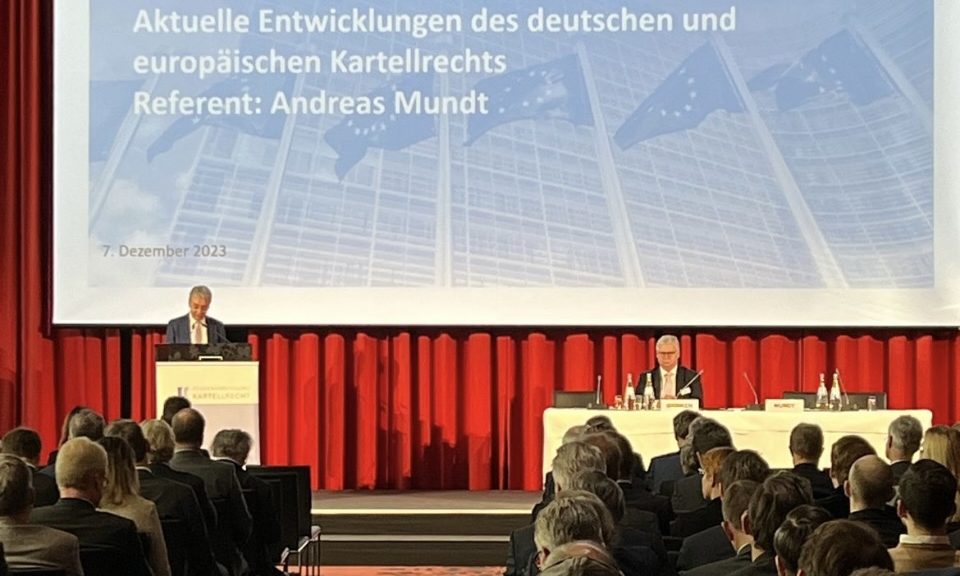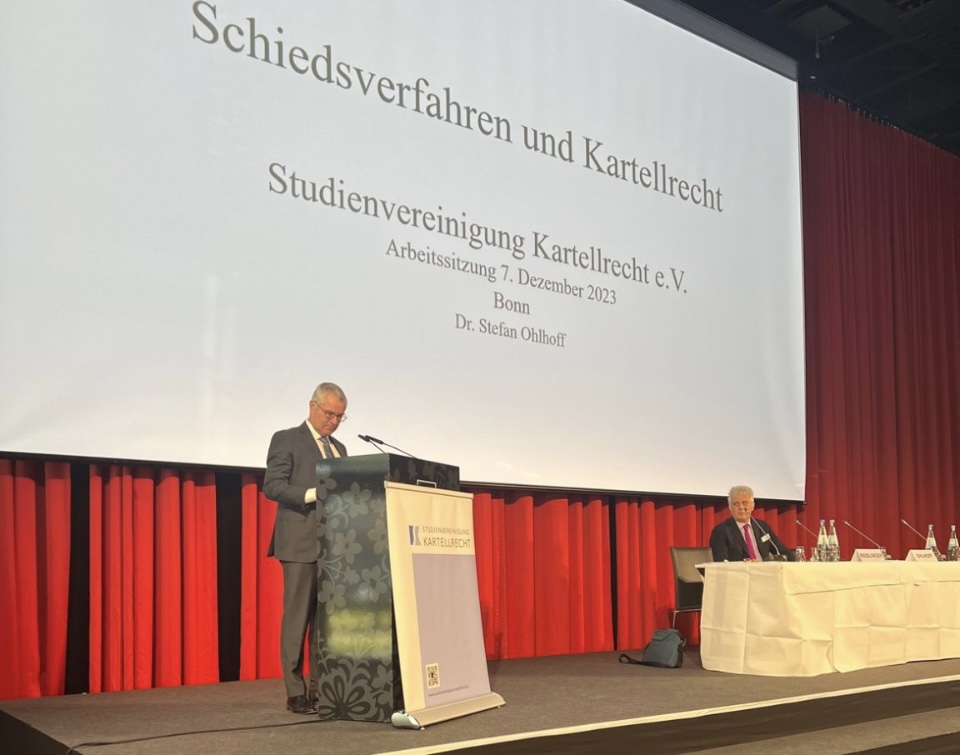
Conference Debriefing (40): Studienvereinigung Working Session 2023
PDF Version: Click here
Suggested Citation: Weichbrodt, DKartJ 2023, 116-120
The annual conference of the Studienvereinigung Kartellrecht took place in Bonn on 7 December 2023. Once again this year, the focus was on the major and minor problems of competition law, on looking back and looking forward, but also on the love of the local press – and very specific tastes in the Bundeskartellamt. Johannes Weichbrodt reports.
Traditions are as much a part of Christmas as the star on the fir tree. The family always comes together for the festive season. The food is the same as always, even if the wine is not to the liking of a single youngster who, having recently started his career, is obviously looking to collect Parker points as well as miles (“My cleaning lady wouldn’t even brush her teeth with something like this.”). The “uncle” is once again allowed to say something in a large group that doesn’t really fit the topic. And the self-proclaimed middle-aged youth secretly travelled to the event to spend the evening before at the bar with friends from the past, reminiscing about times when they were still really young. On the day of the party, they listen to the annual review by the head of the family, and then engage in animated discourse about their own intellectual splendour in front of bright red Christmas decorations. A wonderful celebration – with somewhat stark resemblance to the yearly meeting of the German-speaking Antitrust Family:

The Bar at the Bar
Curtain up for the annual conference of the Studienvereinigung Kartellrecht (StudV), the association of the German antitrust bar, in Bonn. The meeting opened with a town hall, to which only a handful of hardcores had turned up at 8.30 am. The regional representatives of the StudV were dutifully thanked for their services, whereupon they were confirmed in office for a further two years without election. The springtime of cartel law has evidently not yet blown the democratic wind down to the lower management levels – but known and proven is a fine principle not only in administrative law. The author, who was also absent with no excuse at this hour, was told by informed sources that the only comment was that someone had asked that next year it be ensured that the bar does not close at 22:30 the evening before (see above). Then nobody has to talk shop about the interchangeability of ice-cold beer from the bar with moderately chilled Kölsch from the reception.
After a brief welcome by Chairman Ingo Brinker, the main act of the day, Federal Cartel Office President Andreas Mundt, played his annual best-of album aka “Annual Press Conference” in front of a full house, as expected. It’s amazing how this man manages to get a 74-page manuscript from the Policy Department across to the competition law people in just under an hour.
Greatest Hits of 2023
He began by taking a look back at the past year and the work of the Amt in difficult global political times. The Bonn authority had been very active in all areas. For example, combating cartels: competition in the maintenance of wheeled armoured vehicles was ensured (important – see “difficult global political times”). Example of abuse of market power: proceedings were initiated against a well-known manufacturer of fizzy drinks (fuzetea et al.). Example of merger control: Theo now makes Landliebe. In this context, it was reported that there were rice pudding aficionados in the Decision Division with such clear brand loyalty that they had almost defined a separate market for rice pudding of Landliebe, the target company. According to Mundt, the last time there were similarly passionate discussions about market definition was with the famous Harz cheese maker (fun fact: 0.6% of German households were “exclusive users of sour milk cheese” in 2008 – was that a fancy diet back then?)

The 11th violin
The office had “not called for the amendment” of the German competition act ARC, said Mundt. I guess that’s what it feels like when you get a violin instead of a Carrera track (just before) Christmas, which you are now asked to play. In particular, the new instrument of Section 32f ARC (measures following a sector enquiry) is the focus of the 11th amendment to the ARC, which came into force on 7 November 2023. The provision states that the Federal Cartel Office may take measures (up to and including unbundling) against companies even without being able to establish a breach of competition law. You can imagine this as if the police confiscated a bicycle not because the cyclist was jaywalking, but simply because he looks like someone who is always jaywalking.
However, President Mundt did not give the impression that he sees the office playing this fiddle too often soon. He says there is a lack of staff: 20 new posts had been applied for, none had been created and at least 10% of the posts are currently vacant. He had already reported similar concerns to the Bundestag in June. In view of the scarce resources, which markets could be looked at more closely? Parcel services, the event industry and regulated markets.
After the amendment is before the amendment
The President then gave an outlook on the 12th amendment to the ARC, the consultation process for which began one day before the 11th amendment came into force, in particular on sustainability issues and consumer protection. The Bundeskartellamt notes that the Ministry has made sustainable competition a priority and that the EU Commission’s new horizontal guidelines also address ESG cooperation. On the subject of consumer protection, which is to be strengthened by the amendment, Mr Mundt told of his Kafkaesque, multi-day telephone odyssey to cancel a flight, which led him via various call centres all the way to Phoenix, Arizona. You can do anything on the portal – just not cancel. This story will have reminded some people of how Mr Mundt was once unable to extend a hotel room at a cheaper price on site than on a booking platform. The rest is (antitrust) history. Flight booking portal operators may well be advised to look around for suitable legal advice.
The Amt does not approve of the plans to further lower the thresholds for merger control. Last year, the office examined fewer than 800 notifications, a decrease of 40%. A further reduction would not relieve the burden on SMEs, but would only play into the hands of the big players. (Phew – a sigh of relief went through the room full of people who earn their wine (see above) by writing merger control notifications, among other things).

Digital Cartel Busters
In his entertaining speech, the President then touched on a number of other topics that always go down well: Deutsche Bahn (“No, the railway won’t be broken up, even if Bild says so, but a bit more competition would be nice.”); this Internet that everyone is now talking about (Apple, Amazon, and Google – proceedings pending) and – of course – digitalisation. For example, 50% of colleagues have switched to eFiles (will Bonn file trolleys soon be flooding eBay as “vintage bar trolleys”?). IT-based market screening seems to be the thing of the hour. Unfortunately, even when asked, the top cartel prosecutor refused to let us look into his digital bag of tricks. The authority increasingly needs such ominous high-tech tools like those from the Minority Report prop, partly because leniency applications continue to decline: Only less than 50% of proceedings are still based on them (in 2023 there were 14 cases).
Finally, Mr Mundt reported briefly on the International Competition Network, for which he was once again confirmed as Chairman (he assured us that this was “the last time”, but presidents often say that). There, they discuss diverse topics such as Competition & Agriculture/Food (led by Kenya) and AI. The latter had also just been discussed for three days at the meeting of the G7 competition law working group in Tokyo (including the Microsoft/OpenAI deal). At this point, the partner who had reported with deep concern the previous evening that his HON Circle status with Lufthansa was on the brink (“corona repercussions”) probably looked up enviously at the podium. This Mundt guy, he really gets around.
SIECing and losing
Following Mr Mundt, Thomas Wessely (Freshfields) had the opportunity to explain why he had wrongly gone down fighting (as he self-promoted it) in the CK Telecoms proceedings. The case was a classic 4-3 merger in the mobile telephony sector. In essence, the question was whether the merger would create a Significant Impediment of Effective Competition (SIEC). Mr Wessely pointed out a number of shortcomings in the Commission’s and ECJ’s evidence and reasoning. Ultimately, the current case law threatens to render the SIEC test completely without limits. Part of the SIEC test is whether the merger eliminates an “important competitive force”. With the ECJ case law, it is no longer necessary for the important competitive force to stand out from other competitors. This means that an “important competitive force” is no longer only the nearest or second nearest competitor, but in fact even the most distant competitor. Furthermore, it is sufficient if a restriction of competition is only “more likely than unlikely” – which is problematic in view of the considerable intensity of the intervention, according to Wessely.
Linda Gratz (E.CA Economics) added to the comments in her presentation from an economic perspective, in particular with regard to the Commission’s failure to take into account the very significant efficiencies that the merger would have brought. In response, Professor Daniel Zimmer (University of Bonn) argued that it was doubtful whether fixed cost savings would be passed on to consumers.
Unsurprisingly, Silke Hossenfelder from the Bundeskartellamt welcomed the decision; the General Court’s decision had made the SIEC test inapplicable. The ECJ has set the record straight. In an oligopoly, all competitors are important. For the sake of simplicity, wouldn’t it make sense then to amend the ARC and the EUMR accordingly: “Mergers in markets with fewer than five suppliers are prohibited.”?

Award season
The somewhat unfortunate decline in merger control proceedings for many in the room (see above) makes new fields of activity appear attractive – for example as an antitrust hired gun in international or national arbitration. As Stefan Ohlhoff (WilmerHale) succinctly pointed out in his presentation, competition law advice before arbitration tribunals is becoming increasingly important, not least against the background of the Basalt Quarry decision. This raises a number of interesting legal questions, such as whether every violation of German competition law also constitutes a violation of the ordre public (no, just the big ones) and how a far-reaching review by ordinary courts is compatible with the prohibition of revision au fond (just the big ones). Finally, a favourable arbitral award risks becoming worthless (but by no means free) if it cannot be enforced. This relevant risk must already be taken into account in national and international arbitration proceedings. The decisive factor is what comes out at the end, i.e. at the very end (during enforcement). The presiding judge at the German Federal Supreme Court (BGH), Prof. Wolfgang Kirchhoff, once again emphasised the importance of antitrust law in the context of arbitration. There is now a consensus on this at the BGH (“no leaf fits between the senates”). This should have been good news for those present from academia (aka expert witnesses) and the legal profession alike.

Rustling in the paper jungle
Finally, Donata Beck (Oppenländer) gave an overview of the latest decisions in the area of press mergers – just the day before, the Higher Regional Court of Düsseldorf (OLG) had confirmed the Bundeskartellamt’s approval of the co-operation between BCN and Funke. “Cautious, critical, focussed” is the practice of the Bundeskartellamt in this area, Beck said. Due to the particular importance of the press for democratic decision-making, the thresholds for taking action in this area are considerably lower. As is well known, these are classic two-sided markets (readers / ads) and it is not easy to determine the relevant markets on both sides. For example, do print and online editions of the same newspaper belong to the same market? In fact, the Bundeskartellamt makes very detailed distinctions. The rapporteur from the Office confirmed that the importance of a diverse press landscape meant that they were looking very closely, not least to prevent obsequious journalism at the local level. However, in view of the economic difficulties faced by regional and local print media in particular, it would certainly make sense to be more open to co-operations in both the editorial and marketing areas. Consolidation is unavoidable, especially at the local level, according to Ms Beck.
At the end, Ingo Brinker took the floor once again and bid everyone farewell in a relaxed pre-Christmas period. As always, it was a fulfilling day of discourse and food for thought with a good portion of almost familial solidarity between those connected to competition law.

Dr Johannes Weichbrodt, LL.M. (King’s College London) is a lawyer and partner at Mayer Brown, Düsseldorf.
Photos from the event by Adrian Deuschle.
The meeting of the Studienvereinigung was also one topic in our AI Antitrust Advent Calendar. You find all “doors” here.
If you do not want to miss any of our reporting, please subscribe to our blog’s newsletter here.
2 thoughts on “Conference Debriefing (40): Studienvereinigung Working Session 2023”
Sehr flott geschrieben, danke und Kompliment!
So ein Käse!
Auf dem zweiten Bild sind allemöglichen Käsesorten zu sehen, nur kein Sauermilchkäse aka Harzer Roller Der sieht nämlich so aus: https://deutsche-delikatessen.de/harzer-roller-harzer-kaese/
Das Bild ist also grob irreführend (typisch Internet!), wo bleibt der (behördliche?) Verbraucherschutz?